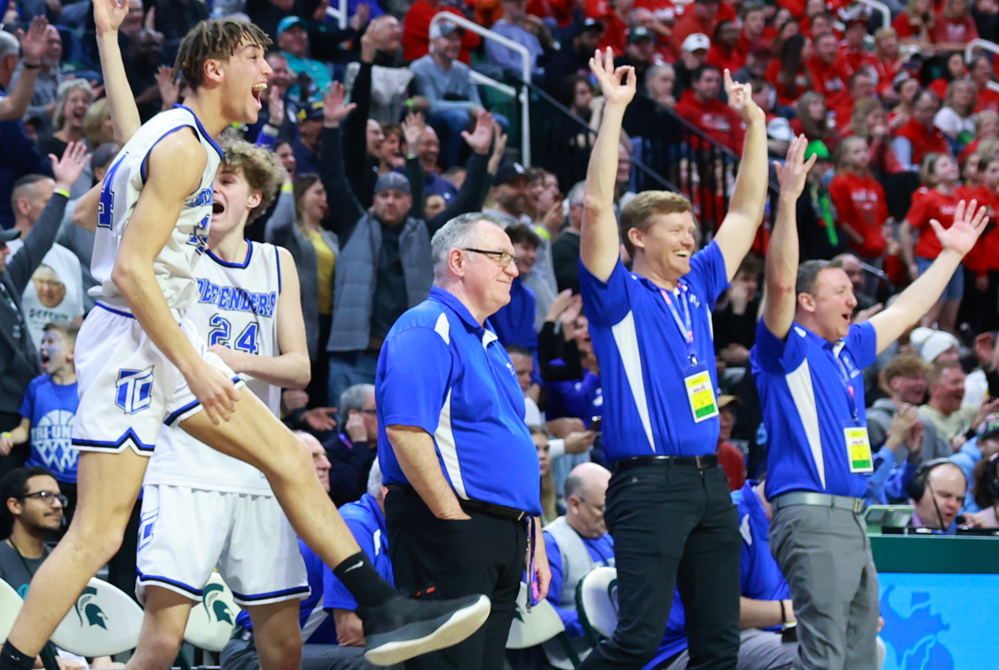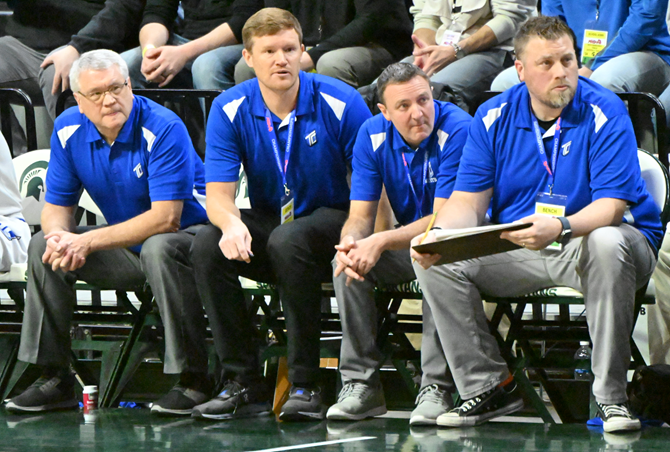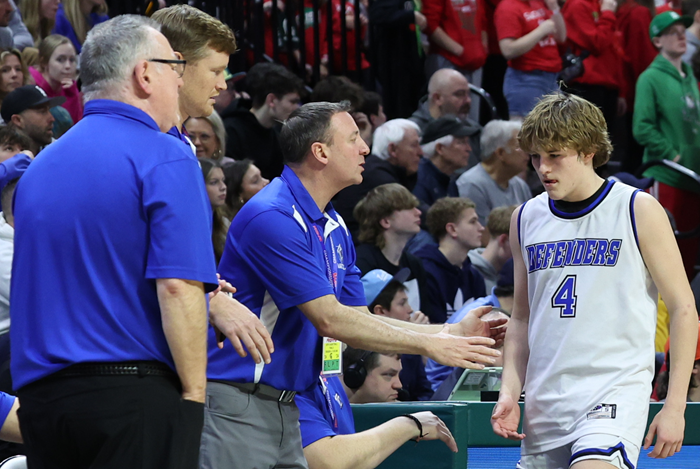
Concussion Testing Pilots Kick Off Fall
August 4, 2015
By Geoff Kimmerly
Second Half editor
The Michigan High School Athletic Association kicked off the 2015-16 school year Monday by hosting 70 member high schools for training in two pilot sideline concussion testing programs aimed at assisting in decision-making regarding the removal of athletes from activity after possible concussion events and record-keeping of those events beginning this fall.
Illinois-based King-Devick Test and Maryland-based XLNTbrain Sport each will be used to monitor approximately 10,000 Michigan high school student-athletes drawn from schools representing all four classes and a variety of regions statewide.
The pilot programs are part of a three-pronged advance by the MHSAA in concussion care this fall. In addition to becoming the first state association to offer pilot sideline concussion testing, the MHSAA will be the first to mandate record-keeping by member schools of all possible concussion events from detection to an athlete’s return to play. The requirement applies to both practices and events, all levels of all sports in grades 7 through 12.
The MHSAA also this fall is the first state association to provide all participants at every MHSAA member high school and junior high/middle school with insurance intended to pay accident medical expense benefits – covering deductibles and co-pays left unpaid by other policies – resulting from concussions sustained during MHSAA practices or competitions. There is no cost to either schools or families.
“These pilot programs are intended to not only improve what’s actually happening on the sidelines at practices and contests in these communities that are part of the pilot programs, they’re intended to spread the word of the need for improved concussion detection across every community,” MHSAA Executive Director John E. “Jack” Roberts said. “We hope these schools involved will become involved in their leagues and conferences and with their peers across the state as we expand the awareness of the need for better sideline detection and provide ways to get it done.”
The MHSAA asked schools at the end of this spring to volunteer for the pilot programs and then selected participants in order to guarantee a variety of schools based on enrollment and location. Schools are committed to involving at least two sports for each gender each season.
Schools participating in the XLNTbrain Sport pilot program are: Adrian, Adrian Madison, AuGres-Sims, Bay City Central, Bear Lake, Brethren, Belding, Birmingham Groves, Brighton, Chesaning, Corunna, Detroit Collegiate Prep, East Kentwood, Fennville, Fowlerville, Gibraltar Carlson, Grand Rapids Christian, Grandville, Greenville, Grosse Ile, Hamilton, Harrison Township L’Anse Creuse, Hazel Park, Kalamazoo Christian, Lansing Christian, Macomb L’Anse Creuse North, Owosso, Pewamo-Westphalia, Portland, Reese, Rochester Hills Lutheran Northwest, St. Clair Shores Lakeview, St. Johns, Stanton Central Montcalm, Vermontville Maple Valley, West Bloomfield and Wyoming Kelloggsville.
Schools participating in the King-Devick Test pilot are: Bay City Western, Benton Harbor, Buchanan, Calumet, Caro, Caseville, Detroit Cody, Detroit Martin Luther King, Fenton, Flint Kearsley, Frankenmuth, Fruitport, Garden City, Grand Ledge, Grand Rapids Northview, Lake Leelanau St. Mary, Lake Linden-Hubbell, Lincoln Alcona, Midland Bullock Creek, Montague, Muskegon, Niles, Pontiac Notre Dame Prep, Romeo, Saginaw Heritage, Scottville Mason County Central, Shelby, St. Charles, St. Joseph, Tawas, Vicksburg, Whitehall and Yale.
The King-Devick Test is a rapid eye movement screening evaluation that requires athletes to read single-digit numbers displayed on a tablet computer in order to detect impairments of eye movement, attention, language, concentration and other symptoms of abnormal brain function. The test has been validated in more than 50 recent peer reviewed articles published in elite medical journals and is associated with the Mayo Clinic.
The test is administered on the sidelines during evaluations for suspected head injuries, and the post-injury results are then compared to an athlete’s preseason baseline. Any worsening of performance (increased time and/or errors) suggests a concussion has occurred and the athlete should be “removed from play” for further evaluation.
“The first and most critical step in managing concussion in the youth athlete is to recognize when one has occurred – not always a simple task,” said Dr. David Dodick, professor of neurology and director of sports concussion services at the Mayo Clinic. “The King-Devick test helps take the guesswork and subjectivity out of the sideline evaluation in a rapid, accurate, and objective way.”
 XLNTbrain Sport includes balance and web-based neuro-cognitive tests also used before the start of a season to create a baseline measurement of reaction time, attention, inhibition, impulsivity, memory, information processing efficiency and executive function. The test also assesses mood, anxiety, stress and emotionality.
XLNTbrain Sport includes balance and web-based neuro-cognitive tests also used before the start of a season to create a baseline measurement of reaction time, attention, inhibition, impulsivity, memory, information processing efficiency and executive function. The test also assesses mood, anxiety, stress and emotionality.
After a possible head injury, a sideline assessment is done using a smartphone or tablet with those results then compared with the athlete’s baseline measurements. The program documents the severity of a concussion, provides a guide for on-the-field decision making regarding treatment and recovery time and can report results via email to parents, coaches, training staff and medical professionals.
Dr. Harry Kerasidis, who designed the XLNTbrain Sport software, presented at the Coalition for Concussion Treatment Summit at the United Nations building in 2014.
“We included an objective balance test that relies on smartphone accelerometer technology which is effective in the field during practice and game situations,” Kerasidis said. “Should a concussion injury be suspected, the system automatically generates a notification to parents and medical professionals and creates a recovery protocol and post-injury tracking so the right people can monitor the athlete’s progress. Then, the system assists medical professionals with the all-important return-to-learn and return-to-play clearance.”
Click for information on XLNTbrain Sport. Click for information on the King-Devick Test.
For more on Health & Safety, including preseason physical examination, hydration and cardiovascular resources in addition to concussion information and online training sessions, visit the MHSAA’s redesigned Health & Safety web page.
PHOTOS: (Top) Saginaw Heritage athletic director Peter Ryan (right) is administered the King-Devick baseline test by K-D's Samantha Figueroa. (Middle) XLNTbrain Sport creater Dr. Harry Kerasidis provides insight on his program to those being trained to use it Monday.

Championship Experience from Coach's Point of View Unimaginable, Unforgettable
By
Dean Holzwarth
Special for MHSAA.com
April 4, 2024
WYOMING – As the final buzzer sounded, it was all I could’ve imagined – and more.

In the weeks leading up to March 16 and the Division 4 championship game, I experienced every emotion possible as I envisioned what it would feel like to be an assistant coach on the bench at Michigan State’s Breslin Center as the Wyoming Tri-unity Christian boys basketball team achieved its ultimate goal.
In my first year as the junior varsity coach at Tri-unity, I had been on the varsity bench for a majority of the season, assisting legendary coach Mark Keeler and fellow assistants Brent Voorhees, Bob Przybysz and Mike Kaman.
I was there encouraging, motivating and supporting the varsity team. It was a role I embraced, and had become accustomed to over my almost 30 years coaching high school basketball.
I started coaching in 1995 as Jim Ringold gave me my first opportunity as the freshmen girls coach at Wyoming Kelloggsville High School. I would then coach Kelloggsville’s freshmen boys team for eight seasons, while also coaching the freshmen girls at Grandville High School. I would also coach the junior varsity teams at both schools.
I love coaching. I have a passion for it. I’ve always enjoyed getting the most out of my players while creating a bond between player and coach.
When girls basketball season moved from fall to winter joining the boys in 2007-08, I stayed at Grandville. I spent 21 seasons there before stepping down.
I still wanted to coach, and I heard that the Tri-unity junior varsity position was available. I had always respected and liked Keeler and was excited for the prospect of joining a perennial powerhouse.
I didn’t really know about Tri-unity growing up in the Wyoming Park school district. But as a young kid, I would rush home and eagerly await the afternoon delivery of the Grand Rapids Press. I would quickly find the sports page and read it from front to back, hoping one day to see my byline.
I began writing for the Press’ sports department in 1997. It was my dream job. And that’s also when I first started covering Tri-unity boys basketball.
I remember watching eventual NBA all-star Chris Kaman, along with Bryan Foltice and others play for this little Christian school and have unbridled success under Keeler.
MHSAA Tournament runs became the norm for the Defenders. They won their first Finals title in 1996, and they would claim four more over the next 26 years. They also had six runner-up finishes.
 I was sitting on media row writing for MHSAA.com in 2022 when Brady Titus led Tri-unity to its fifth state championship.
I was sitting on media row writing for MHSAA.com in 2022 when Brady Titus led Tri-unity to its fifth state championship.
I never thought that two years later I would be on the coaching staff as the Defenders pursued another one. But there I was.
I knew this year’s team had the potential to be special.
Tri-unity had returned four of its five starters from a year ago, after suffering a heart-breaking two-point loss to Munising in the Division 4 Final.
Eight seniors were on the roster. The team had a mix of talented guard play, senior leadership, size and depth. We had shooters and we played great defense, a trademark of Keeler’s teams.
This was the year, and that heaped lofty expectations on Keeler and the team. It was basically “state championship or bust.” Anything less would be considered a disappointment.
Keeler wanted it badly, and I knew the players did as well. I think they felt the pressure at times of living up to the expectations that had been set.
We had several lopsided wins, but also had a few tough losses to Division 2 and Division 3 teams – Grand Rapids Forest Hills Central, Wyoming Lee, Grandville Covenant Christian and Schoolcraft – all talented teams that I think made us better despite falling short.
As the postseason started, there was anxiety and excitement.
We were one of the favorites, but it wouldn’t be easy. We would have to earn each of the seven victories needed to win it all.
First came a District title, but then we had to play a quality Fowler team in its home gym in the Regional Semifinal. This was a game we knew would be a challenge – and it was.
We led by only one at halftime after a 7-0 run to end the second quarter. The score was tied 33-33 in the fourth quarter before senior Lincoln Eerdmans made a key 3-pointer to spark our victory.
As we went through the handshake line, several Fowler players said, “Good luck in the Finals.”
Our defense played extremely well in the Regional Final and state Quarterfinal to secure our team another trip to the Breslin.
St. Ignace was our opponent in the Semifinal, and we had to face a senior guard who could do it all – Jonny Ingalls. He lived up to the hype. He was good, and we didn’t have any answer for him in the first half. We trailed by one, only to fall behind by seven late in the third quarter.
Was this the end? Were we going to fall one game short of our goal?
 We were down by five points in the fourth quarter, but junior guard Keaton Blanker, and others, rose to the occasion. We rallied to win a tight one, and now we were one win away from a Division 4 title.
We were down by five points in the fourth quarter, but junior guard Keaton Blanker, and others, rose to the occasion. We rallied to win a tight one, and now we were one win away from a Division 4 title.
The night before the championship game, we stayed at a hotel in East Lansing as we had the first game of the day at 10 a.m. We had a team dinner, and the players seemed relaxed and eager to close out the season the way they had intended.
There was one thing that worried me. We were playing Mount Pleasant Sacred Heart. A team we had played in the second game of the season and defeated by 30 points.
Would we be overconfident? I had no idea. They were a different team now, but so were we. Anything could happen.
Keeler gave a spirited and emotional pregame speech. In last year’s loss to Munising, he felt like the team played not to lose, and this season his big thing was “I want to win.” He said it to every starter that Saturday morning during the final moments in the locker room before tipoff, asking all five individually to say it back – which they did, the first one quietly but followed by teammates replying louder and louder as everyone got fired up and “I want to win” rang through the locker room. I think it inspired all of us.
After a competitive first quarter, we started to find our rhythm and expanded the lead. We were ahead by double-digits at the half, and a state title was within our grasp. Senior Wesley Kaman buried a 3-pointer in the final seconds of the third quarter to give us a 20-point cushion. It was at that point I knew we were going to win.
All five starters reached double-figure scoring, led by Jordan VanKlompenberg with 19 points and Owen Rosendall with 14. That balance was intentional and a successful sign for our team all season.
The exhilaration of winning was intoxicating. I loved watching the boys celebrate something they had worked so hard to accomplish. I will never forget their faces. I looked to my right from my seat on the bench and watched them running onto the court, just wearing their joy. They were just elated.
I was so happy for Keeler, a devout Christian who is respected by so many people in high school basketball circles. I learned so much from him this season. The way he approaches each game, his competitiveness. He instills his strong faith in his players and understands that the game of basketball is a bridge to a higher purpose.
Keeler is the fourth-winningest coach in state boys basketball history with a record of 694-216, and will be the winningest active coach next winter as all-time leader Roy Johnston retired from Beaverton at the end of this season.
The tournament run was one of the best coaching experiences I have had, and I feel blessed to have had the opportunity to be a part of a state championship season.
 Dean Holzwarth has covered primarily high school sports for Grand Rapids-based WOOD-TV for five years after serving at the Grand Rapids Press and MLive for 16 years along with shorter stints at the Ionia Sentinel and WZZM. Contact him at [email protected] with story ideas for Allegan, Kent and Ottawa counties.
Dean Holzwarth has covered primarily high school sports for Grand Rapids-based WOOD-TV for five years after serving at the Grand Rapids Press and MLive for 16 years along with shorter stints at the Ionia Sentinel and WZZM. Contact him at [email protected] with story ideas for Allegan, Kent and Ottawa counties.
PHOTOS (Top) The Wyoming Tri-unity Christian bench, including the author (far right) and head coach Mark Keeler (middle), celebrate a 3-pointer late in the Defenders’ Division 4 championship win over Mount Pleasant Sacred Heart. (Middle) Tri-unity’s assistant coaches, including Holzwarth (second from right), monitor the action. (Below) Holzwarth and the coaching staff greet Keaton Blanker (4) as he comes off the floor. (Photos by Hockey Weekly Action Photos.)

